Sodium Savvy: Why Worry About Sodium Intake?
Let's continue our sodium exploration, shall we?The post, Sodium Savvy, offered a great introduction to salt and sodium, exploring the composition of salt, sodium consumption guidelines, and current sodium consumption patterns. The bottom line is that many Americans eat far too much sodium each day.So why is that important?Frankly, too much sodium is terrible for your health.To explore this in more depth, let's take a look at a few slides from the PowerPoint presentation Sodium Savvy. (The full presentation is available now in the Nutrition Education Store!)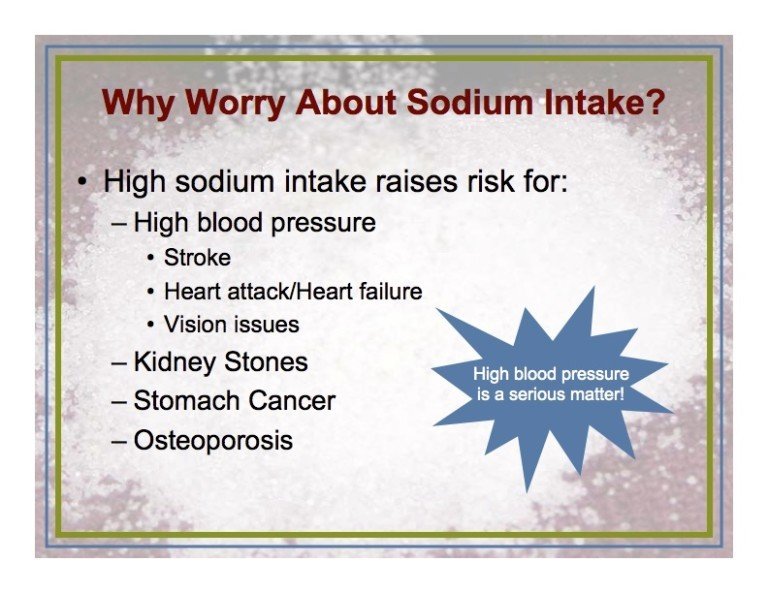 A high sodium intake has been linked to a variety of diseases. The biggest one is high blood pressure. Blood pressure has been shown to rise progressively as sodium intake increases, especially in individuals with hypertension, diabetes, or chronic kidney disease, or who are older adults and/or African Americans.High blood pressure, in turn is a huge cause of things like stroke, heart attack, congestive heart failure, kidney failure, and vision issues. Let's take a closer look at high blood pressure...
A high sodium intake has been linked to a variety of diseases. The biggest one is high blood pressure. Blood pressure has been shown to rise progressively as sodium intake increases, especially in individuals with hypertension, diabetes, or chronic kidney disease, or who are older adults and/or African Americans.High blood pressure, in turn is a huge cause of things like stroke, heart attack, congestive heart failure, kidney failure, and vision issues. Let's take a closer look at high blood pressure...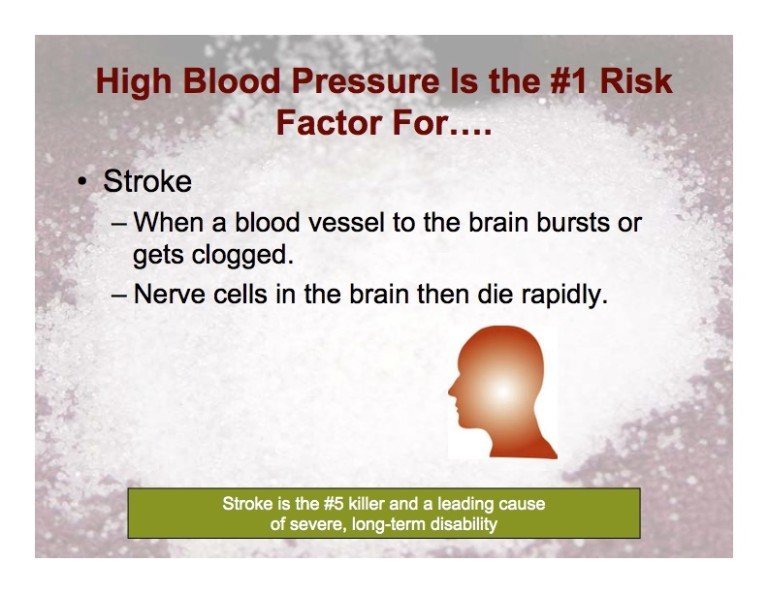 According to the American Stroke Association, high blood pressure is the #1 risk factor for a stroke. A stroke happens when a blood vessel to the brain bursts or gets clogged. Nerve cells in the brain then die rapidly, leaving damage in their wake. Remember, stroke is the #5 most common cause of death and a leading cause of severe/long-term disability.
According to the American Stroke Association, high blood pressure is the #1 risk factor for a stroke. A stroke happens when a blood vessel to the brain bursts or gets clogged. Nerve cells in the brain then die rapidly, leaving damage in their wake. Remember, stroke is the #5 most common cause of death and a leading cause of severe/long-term disability.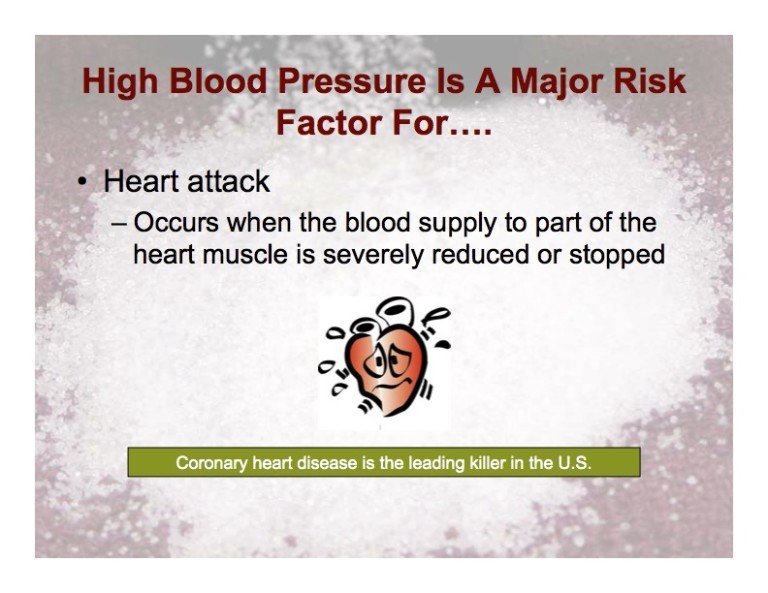 High blood pressure is also a major risk factor for heart attacks. These occur when the blood supply to part of the heart muscle is severely reduced or stopped. Coronary heart disease is a leading killer in the United States.Speaking of hearts and risk factors, high blood pressure is a significant risk factor for congestive heart failure, which occurs when the heart is unable to pump enough blood for the body's needs.
High blood pressure is also a major risk factor for heart attacks. These occur when the blood supply to part of the heart muscle is severely reduced or stopped. Coronary heart disease is a leading killer in the United States.Speaking of hearts and risk factors, high blood pressure is a significant risk factor for congestive heart failure, which occurs when the heart is unable to pump enough blood for the body's needs.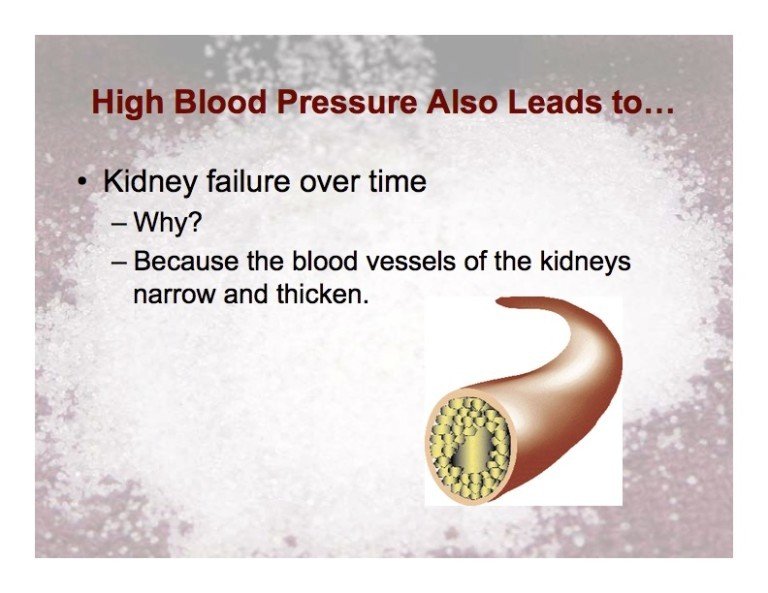 Moving on to other organs, did you know that high blood pressure can lead to kidney failure as the blood vessels to the kidneys narrow and thicken?Finally, high blood pressure can compromise eye health. When blood pressure is high, blood vessels in the eye can rupture or bleed, which in turn can cause vision impairment and blindness.Sodium has been closely linked to high blood pressure, which means that it can raise a person's risk of all these conditions.The good news is that, according to the Dietary Guidelines for Americans, "Because of the linear dose-response relationship between sodium intake and blood pressure, every incremental decrease in sodium intake that moves toward recommended limits is encouraged. Even without reaching the limits for sodium intake, strong evidence indicates that reductions in sodium intake can lower blood pressure among people with prehypertension and hypertension."Now you see the stakes. Reducing sodium intake is imperative to the health of most Americans. Feel free to use a PDF copy of these slides to share this information with your clients.
Moving on to other organs, did you know that high blood pressure can lead to kidney failure as the blood vessels to the kidneys narrow and thicken?Finally, high blood pressure can compromise eye health. When blood pressure is high, blood vessels in the eye can rupture or bleed, which in turn can cause vision impairment and blindness.Sodium has been closely linked to high blood pressure, which means that it can raise a person's risk of all these conditions.The good news is that, according to the Dietary Guidelines for Americans, "Because of the linear dose-response relationship between sodium intake and blood pressure, every incremental decrease in sodium intake that moves toward recommended limits is encouraged. Even without reaching the limits for sodium intake, strong evidence indicates that reductions in sodium intake can lower blood pressure among people with prehypertension and hypertension."Now you see the stakes. Reducing sodium intake is imperative to the health of most Americans. Feel free to use a PDF copy of these slides to share this information with your clients.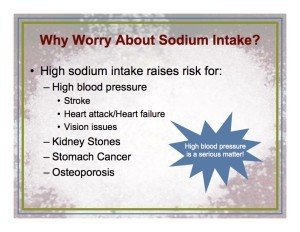 And remember, the Sodium Savvy PowerPoint show is full of over 50 slides with more information just like this, along with practical ways for people to reduce their sodium intake! It's a phenomenal nutrition education resource!
And remember, the Sodium Savvy PowerPoint show is full of over 50 slides with more information just like this, along with practical ways for people to reduce their sodium intake! It's a phenomenal nutrition education resource! Finally, for more information about hypertension and blood pressure, don't miss these amazing materials from the Nutrition Education Store!
Finally, for more information about hypertension and blood pressure, don't miss these amazing materials from the Nutrition Education Store!




